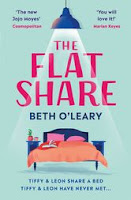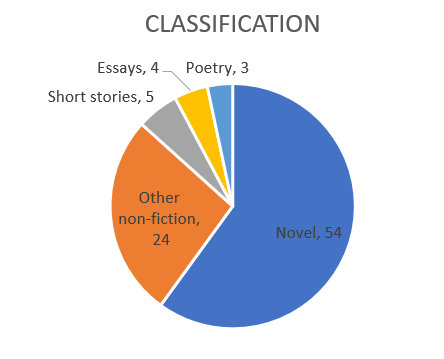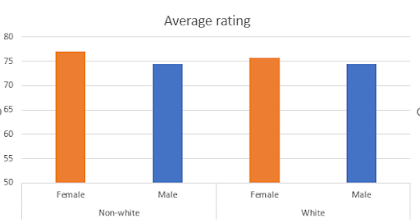I first tweeted out my 2021 top 10 (with GIFs!) in December, which kinda took the heat out of me actually doing this post. But when I finally got around to it, I realised my list of 89 books read was missing one.
Interpretation: My eyes suck. I've worked hard for nearly two decades to be a good reader with my ears. This enabled me to read 90 total books this year, a significant step up from 66, 61, 42, and 66 in the preceding years.
Interpretation: Backslid from 2020 when on 41% of authors identified as male (52% the year before that).
Interpretation: Still a 'work on' (the same old saws about audiobook availability etc etc). 18% in 2020.
And that book should have been in my top 10.
Published in 2011, collecting magazine pieces from even earlier, but it didn't feel dated. Sullivan was tapping into the racial, religious and economic discontent that would propel Trump into the White House - that's part of it. But his voice is so clear, distinct. I really want to read a collection of his essays from the last 10 years...
This is the book I thought I was going to read when I picked up End Times by Bryan Walsh in May. I wasn't sure if I was ready for more apocalypsia so soon, but O'Connell's book lived up to my (deferred) expectations. Maybe it's homerism, but I enjoyed the section set in NZ the most. Often, that would be the part where the hollowness of the European correspondent rang through, but not here.
Shit. I mean, THIS BOOK WAS MY NUMBER ONE.
So good. A top ten book of my reading year for sure. Friendship, youth, music and loss all intertwine. 1980's Glasgow and Edinburgh shine through, as does this novel's winning heart.
SOOOOOOOO GOOOOOOOD.
Maybe I'm starved of down-to-earth literary criticism, but this book was probably the biggest encouragement to start writing again of anything I've read, done, seen or heard this year
A gem. I loved it from the first sentence. I worried for a bit that it was going to swerve too much into the territory of Convenience Store Woman, but it remained enough of it’s own thing to be a triumph!
 What I said about it in June:
What I said about it in June:
Gonna call it now: this is the funniest book I will read all year.
Is it a novel? Is it another autobiography, veiled this time by the third person pronouns? Is it longform poetry?
Answer: it is the natural end result when language and attention and logic come out the other side of being "extremely online".
Buy a ticket, buckle up and enjoy the ride.
Right book, right time. One test of a book is how often you bring it up in conversation and I've been able to refer to, and evangelise about, Braiding Sweetgrass often in the weeks since reading it.
It ranges widely - and does drift in parts, being rather long - but the topic is so broad (see that subtitle) and the process of decolonising the thinking of a reader such as me when it comes to plants takes time.
Wow. Read this immediately after reading this piece by Angela Meyer. Thank you Angela and thank you Tyson (and thank you Audible and I guess, grudgingly, Amazon, for making this book free to all members so hopefully many more will read/listen to this and extend the yarning).
Books like this raise interesting questions about form. As an audiobook narrated by the author it more closely resembles the kind of yarning and sand talk at the heart of the culture Yunkaporta shares, but the listener misses out on the sand talk symbols as visual things (my brain, at least, cannot follow extended descriptions of unique symbols). In the end, all books are imperfect and incomplete in whatever form they take, and it's the work of the reader to complete the circle.
8. Islands of Decolonial Love by Leanne Betasamosake Simpson (short stories, audiobook, Canada, 2013)
Wow. This book is exciting. It starts out with short stories in a recognisable, North American mold. It felt a little like a first nation's Jesus' Son - and then the stories lean more into Nishnaabeg modes and language. Another bad comparison: it felt like the bait and switch in David Vann's Legend of a Suicide where the death (the dyer?) in the second half is unexpected and makes you re-evaluate everything. This time, it's like: where those first stories good on their own terms or were they bait to lure me in.
Okay, so, hear me out. I enjoy reading romance...
The set-up (a male hospice nurse who works nights rents out his flat 7pm to 7am to a junior book editor so he can pay legal fees for his brother, and the two flatmates only converse through post-it notes...) is super hooky.
Sometimes the beats felt like they came with signposts: THIS IS A BEAT.
But I devoured it. I like romance. It only took me 38 years.
What I said about it in May:
How did this happen? I must've read this book over the crest of two months, thereby leaving it out of my monthly/bi-monthly consumption diary, which I used to create my Excel list of titles for ranking and statistical dissection.
So let's start with #1 and taiho on the pie charts for a tick.
1. Sorrow and Bliss by Meg Mason (novel, audiobook, NZ, 2020)
This novel is funny. This novel is dark. It's like a perfectly weighted handgun. Like someone you hate saying the quiet part loud. Like the thrill of having your stitches pulled and the anticipation of whether your flesh will hold.
There's a caesura at the centre. An illness afflicts the narrator, Martha. It's mental, it's genetic, it explains a lot... only it's referred to as "--"in the physical book and "x" in the audiobook. It's not meant to stand in for any one particular real-life illness. In the wrong hands, this vagueness, this game-playing, would cheapen everything. But Martha is so completely rendered, so real, such good company on the page, that we feel this diagnostic void as she must have in all those years before its absence, and even since. What power does naming have over chemistry? Over years of interpersonal muscle memory?
I wanted to read it again immediately after finishing it. This is a thing people say, but I rarely ever feel.
I want to read it again now. For a raft of reasons, both to do with the book and events in the lives of friends and family.
None of this has anything to do with the fact Meg Mason was born in Foxton, but that, too, is awesome.
What I said about it in October:
The best book about mates, mortality and music I have read.
What I said about in in August:
SOOOOOOOO GOOOOOOOD.
Maybe I'm starved of down-to-earth literary criticism, but this book was probably the biggest encouragement to start writing again of anything I've read, done, seen or heard this year
A degustation menu with an avuncular, expert guide. The slow food revolution for the short story. Read me more, Daddy!
4. Earthlings by Sakata Murata (novel, audiobook, Japan, 2020)
4. Earthlings by Sakata Murata (novel, audiobook, Japan, 2020)
What I said about in January:
A gem. I loved it from the first sentence. I worried for a bit that it was going to swerve too much into the territory of Convenience Store Woman, but it remained enough of it’s own thing to be a triumph!
Go weird into that good night!
5. No One is Talking About This by Patricia Lockwood (novel, audiobook, US, 2021)
 What I said about it in June:
What I said about it in June:Gonna call it now: this is the funniest book I will read all year.
Is it a novel? Is it another autobiography, veiled this time by the third person pronouns? Is it longform poetry?
Answer: it is the natural end result when language and attention and logic come out the other side of being "extremely online".
Buy a ticket, buckle up and enjoy the ride.
What I said about it in June:
Right book, right time. One test of a book is how often you bring it up in conversation and I've been able to refer to, and evangelise about, Braiding Sweetgrass often in the weeks since reading it.
It ranges widely - and does drift in parts, being rather long - but the topic is so broad (see that subtitle) and the process of decolonising the thinking of a reader such as me when it comes to plants takes time.
What I said about it in December:
Books like this raise interesting questions about form. As an audiobook narrated by the author it more closely resembles the kind of yarning and sand talk at the heart of the culture Yunkaporta shares, but the listener misses out on the sand talk symbols as visual things (my brain, at least, cannot follow extended descriptions of unique symbols). In the end, all books are imperfect and incomplete in whatever form they take, and it's the work of the reader to complete the circle.
8. Islands of Decolonial Love by Leanne Betasamosake Simpson (short stories, audiobook, Canada, 2013)
What I said about it in May:
Wow. This book is exciting. It starts out with short stories in a recognisable, North American mold. It felt a little like a first nation's Jesus' Son - and then the stories lean more into Nishnaabeg modes and language. Another bad comparison: it felt like the bait and switch in David Vann's Legend of a Suicide where the death (the dyer?) in the second half is unexpected and makes you re-evaluate everything. This time, it's like: where those first stories good on their own terms or were they bait to lure me in.
What I said about it in June:
Okay, so, hear me out. I enjoy reading romance...
The set-up (a male hospice nurse who works nights rents out his flat 7pm to 7am to a junior book editor so he can pay legal fees for his brother, and the two flatmates only converse through post-it notes...) is super hooky.
Sometimes the beats felt like they came with signposts: THIS IS A BEAT.
But I devoured it. I like romance. It only took me 38 years.
...
Which brings us to the 10th spot... Which I'm making two white dudes share because they made my Twitter list and I can't decide who to boot... This is also the point where those of you playing along at home realise that, I've put a romance novel in my top 10 by not Marcel Proust. Yup. Swann's Way came in at 27th, beating 2020's Booker Prize Winner but not the latest Stephen King. Good thing no one is paying that much attention, eh?
Published in 2011, collecting magazine pieces from even earlier, but it didn't feel dated. Sullivan was tapping into the racial, religious and economic discontent that would propel Trump into the White House - that's part of it. But his voice is so clear, distinct. I really want to read a collection of his essays from the last 10 years...
What I said about it in June:
CHART TIME!!
Interpretation: My eyes suck. I've worked hard for nearly two decades to be a good reader with my ears. This enabled me to read 90 total books this year, a significant step up from 66, 61, 42, and 66 in the preceding years.
Interpretation: Backslid from 2020 when on 41% of authors identified as male (52% the year before that).
Interpretation: In 2020 UK and US tied as most common countries of origin with 20 titles each. US more than doubled its count. Wha' happened?
Interpretation: Kinda follows from the above levels of diversity. Page count might've been different thanks to Proust!
Interpretation: A stab at intersectional analysis. To help decide my top ten list, I rank every book I read out of 100 in a not-very-scientific way (for reference, Sorrow and Bliss got a 95 and Is This Anything by Jerry Seinfeld got 60). But it shows that non-white females out-perform the average. And women edge men in general. There may be some selection bias (perhaps I only read "diverse" books I really think will be good, while I'm more willing to read dudes without knowing much about the book?) or maybe I give these diversity titles a higher score to make me feel like a better person when I'm making my list? Am I really that sad? The jury is still out.

















No comments:
Post a Comment